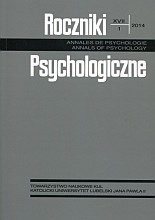The Minimalist Representationalism of the Ecological Theory of Perception
The Minimalist Representationalism of the Ecological Theory of Perception
Author(s): Adriana SchetzSubject(s): Psychology
Published by: Towarzystwo Naukowe KUL & Katolicki Uniwersytet Lubelski Jana Pawła II
Keywords: ecological thoery of perception; James J. Gibson, Perception; simulation; representation; minimalist representionalism; dynamic models
Summary/Abstract: The aim of the article is to consider the possibilities of incorporating the category of mental representation into the ecological theory of perception, devised by its originator, James J. Gibson, as a kind of antirepresentationalism. The full-blooded idea of perceptual representation seems “too heavy” for the needs of the ecological approach, according to which perception consists in directly collecting or apprehending the features of objects present in the environment by means of the senses. Since this process is a direct one, Gibson believes postulating mental representation does not in any way make it easier to understanding it. On the other hand, in contemporary philosophy of mind and cognitive psychology the concept of mental representation is almost indispensable. The article presents an attempt to interpret the perceptual process of information acquisition in terms of dynamic systems theory – or, more precisely, as a kind of simulation. The simulation model of perception based on a minimalist understanding of representation (as procedural knowledge) is meant to complement the ecological theory of perception proposed by Gibson.
Journal: Roczniki Psychologiczne
- Issue Year: 17/2014
- Issue No: 1
- Page Range: 217-235
- Page Count: 19
- Language: English

